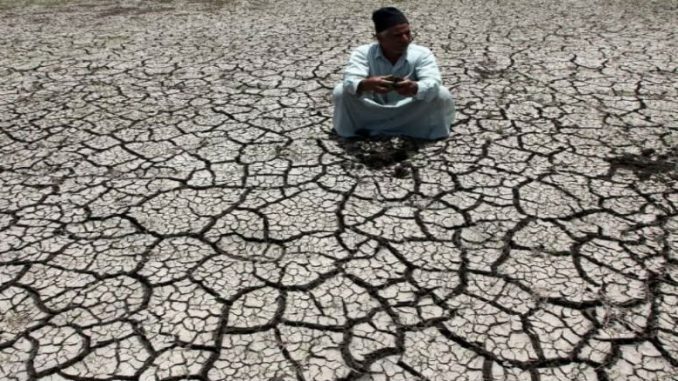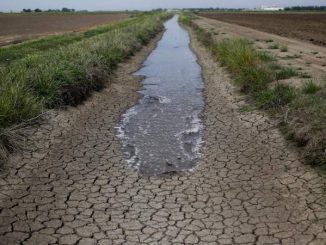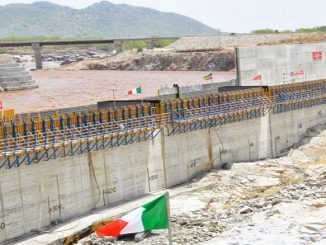
Dramatic water shortage hits Egyptian farmers amid the ongoing problems of the Nile Delta. Last May, the European Parliament released a report titled:” A stable Egypt for a stable region: Socio-economic challenges and prospects “about the challenges that are facing Egypt and their impact on the country’s socio-economic and political stability in the next two decades. Among the most critical challenges facing the North African country was the pressure on water resources that will have with disastrous effect on water and food crisis.
In this context, it seems that that water shortage and the problems of the Nile Delta started to hit Egyptian farmers. The Nile water supply is already struggling to sustain the growing Egyptian population, and issues such as water contamination and salinisation caused by rising sea levels are badly affecting farming in the Delta.
But the problems in the Nile Delta have been decades in the making. Rising sea levels in the Mediterranean have increased the salinity of underground water and the soil. Population growth has put more pressure on existing water resources, while the mass dumping of industrial waste in irrigation canals has polluted waterways.
Above all these problems, a situation is developing upstream in Ethiopia, which carries an existential threat to the Egyptian Nile’s fundamental place in the country’s economy. The Grand Ethiopian Renaissance Dam (GERD) situated on the Blue Nile, which is set to house the largest hydroelectric plant in Africa, is nearing completion. Once construction of the dam is finished, the reservoir it will contain will be filled over a three to five-year period, massively depleting the volume of water flowing into Egypt during that time.
Based on a new report on the deteriorating conditions on the Nile Delta, Abdel Aziz Haikal, an Egyptian farmer, described the situation by reaching down to grab a green shoot from a paddy field in Egypt’s northern Nile Delta at a time of year when the plant should be filled with rice grains. Instead, the farmer rubs the husk between his fingers and says,”Look how empty it is.”
Land in his village was traditionally fed by fresh water from the Nile river, which helped to make his province, Kafr al-Sheikh, one of the most fertile in the delta. But Nile water stopped reaching Mr. Haikal’s village of Abu Saieed five years ago and is becoming ever harder to replace.
For centuries, the banks of the Nile have been home to farms producing rice as well as cotton and wheat. But now water shortages, soil degradation, and pollution have created a crisis that has undermined agriculture in the delta, which is struggling to support millions of impoverished farmers.
Mr. Haikal and his neighbors find that they have no choice but to irrigate their fields with untreated agricultural drainage water polluted by nearby fish farms. They complain it is leading to smaller harvests.
Compounding their problems, the river has become a focus of regional tensions since Ethiopia began to construct a $4.8bn hydropower project on the Blue Nile, the source of most of the water reaching Egypt. Cairo fears that its already strained water resources will decline further when the dam has been completed.
The added factor of a dramatic drop in the amount of river water arriving in Egypt could be catastrophic. As well as leading to the ruin of huge swathes of farmland, it could result in a shortage of water for personal consumption affecting millions of Egyptians.
Ahmed Abdel Alti, Egypt’s irrigation minister, said recently that water scarcity was imposing limits on Egypt’s economic development. The impoverished farmers of the northern Delta have been the first to see the effect in the shape of declining productivity. ”
The Delta is already suffering a water crisis due to existing environmental problems,” said Mohamed Ghanem, a researcher at the government’s agricultural research institute. “The farmers are feeling it and the Ethiopian dam could make things worse.”
Egypt falls well below the internationally accepted definition of water poverty, which is set at 1,000 cubic meters or less per person a year. The country has less than 600 cubic meters per person. Khaled Abu Zeid, head of the Egyptian Water Partnership, a non-governmental organization, said the priorities were to conserve existing resources and find ways to treat wastewater so that it can be recycled for agriculture. ”
There is a problem and a challenge and a cost associated with it, he said. “The volume of wastewater produced will increase as the population rises. There should be bigger investments in recycling, and plans at the beginning of any new project to ensure that they reuse waste water.”
Egyptian officials have been trying to reach a deal with Addis Ababa to secure what Cairo considers its rightful share of the Nile water — an annual 55.5bn cubic meters, which was granted under an accord with Sudan in 1959. The problem is that Ethiopia does not recognize this agreement.
Negotiations continue. But analysts warn that even if Cairo secures the best possible outcome, the country’s water problems will remain. Egypt’s population of 96m is predicted to rise to about 150m by 2050, with no commensurate expansion in water resources.
Mr. Abdel Alti, the minister, has warned that if Egypt does not find ways to adapt to environmental change then “millions of people in the Nile Delta are vulnerable to being resettled, and billions of dollars of investments are at high risk”. In an effort to conserve resources, the government this year launched a crackdown against rice growing in areas where cultivation of the water-intensive crop was restricted.
It has stiffened fines and arrested offenders to ensure that only 750,000 acres of land are planted with rice — less than half the estimated acreage the previous year. The farmers in Abu Saieed grumble about the restrictions, insisting that the water-intensive nature of rice growing helps improve the quality of the land by washing out the salts in the soil.
Eissa Mohamed, a farmer, said, “I expect a lot of people to have to pay fines this year or even go to jail because they can’t pay.” Buffeted by forces they cannot control, the villagers’ view of the future is bleak. “I am pessimistic,” said Mr. Mohamed. “There are more than 3,000 acres in this area at risk of ruin.”
A new round of talks to address Egypt’s concerns over Ethiopia’s dam has been held in Cairo.
Egypt has renewed calls for Addis Ababa to move ahead with negotiations over the Grand Ethiopian Renaissance Dam (GERD) amid growing fatigue on both sides over the issue.
The call came after Egypt’s foreign minister and intelligence chief visited Addis Ababa to deliver a verbal message to Ethiopian Prime Minister Abiy Ahmed.
The visit August 28 was two days after Ahmed criticised an Ethiopian company for delays in completing parts for the GERD.



